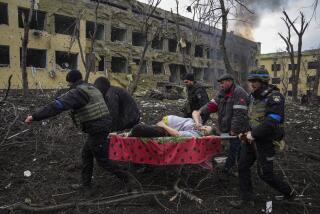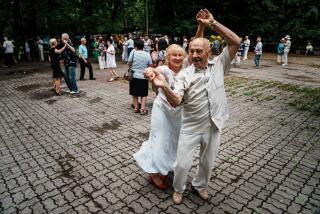THE NEW SOVIET UNION : Kaliningrad: From Closed Past to Uncertain Future : Soviet Union: The historic outpost on the Baltic is open now but separated from the rest of the country.
- Share via
KALININGRAD, Soviet Union — Right in the center of this ancient city once stood a German castle whose twin turret and spire were recognizable all over Europe. Today the castle is a memory, its site occupied by an angular, 25-story behemoth of heavy, gray granite and overwhelming Soviet hideousness.
The “House of Communism” has been under construction for 20 years and is still not finished. It may never be.
“This is a concrete image of the cruelty of the old socialist system,” says Yuri Ivanov, a writer who arrived in what was then known as Konigsberg in 1944 to find it in flames from two successive nights of British bombing. “As the system proved to be useless, so has the building, and now nobody knows what to do with either of them.”
Or with Kaliningrad itself. Closed for decades to all foreign visitors, this Soviet harbor outpost on the Baltic Sea was reopened only last spring, when busloads of German tourists arrived to see what World War II and 40 years of Soviet secrecy had wrought in the grand old Prussian capital.
What they found was a military town out of step with time and modern politics.
Over the years, Kaliningrad had become one of the Soviet military’s principal bases. No precise figures are known, but as many as 600,000 soldiers, sailors, fliers and their families may be stationed in the city and surrounding region today, almost equal to the number of civilians.
Many more troops may be coming as the Soviet Union pulls its troops back from its former East European satellites. Kaliningrad’s location makes it an obvious way station.
But in this place they will live an uneasy existence. Kaliningrad is cut off from the rest of the Soviet Union by Lithuania, which became independent earlier this month. Officially part of the Russian Republic, Kaliningrad and its surrounding districts are separated from the rest of Russia by 300 miles of Lithuania and the Soviet republic of Byelorussia.
Kaliningrad’s status as the only city on the Baltic Sea where nuclear weapons are stored makes the newly independent Baltic nations jumpy. Its claim to being an important line of defense against an attack on Leningrad is no longer taken seriously.
Today Kaliningrad is at once a place of relics and a place of forgetting. Founded by the Teutonic Knights 700 years ago, Konigsberg had a glorious history as a center of Prussian culture and the birthplace of the philosopher Immanuel Kant in 1724.
But at Potsdam in 1945, the Allies awarded the wrecked city to Josef Stalin, who cherished its all-weather port for a military headquarters. Stalin renamed Konigsberg for his Supreme Soviet president, Mikhail Kalinin, and shut the city and its region to all foreigners.
Most of its German residents had fled during the war, and Stalin finished the job in 1947 by evicting the remaining 40,000 with 24 hours’ notice. The city was repopulated by displaced persons from elsewhere in the Soviet empire.
The first tourists to return here, most of them former German residents, found that virtually every vestige of the old had been obliterated. Every city street and square and every outlying hamlet had been given a Russian name.
Some of the damaged old buildings had stood until 1968, people said, when Nikita S. Khrushchev decided that old Konigsberg, the cradle of East Prussian militarism, should finally disappear. Houses that could have been repaired were torn down and their bricks loaded onto barges to serve as construction material in Vilnius, Riga and Leningrad.
What went up in their stead was a nightmare landscape of post-Stalinist architecture, grim ranks of colorless concrete apartment buildings, among which stand the few remaining old homes, with their pointed Hanseatic roofs and rococo trim tower.
The concert hall had been restored and a couple of Gothic churches were preserved in ruins, but most of the old was crumbling with rot and overuse. The Soviets had subdivided every house so that four to six families were crammed into buildings designed for one.
“If you had seen it before the last war--it was a wonder of the world,” says Manfred Wermke, 68, a retired professor of agriculture on his first trip back to the city in which he was born and raised.
That morning he had gone to see the house his father built. Four families were living there. Behind thick glasses, his eyes clouded at the recollection.
“Terrible. . . . There was an army of cockroaches everywhere. In the garden, you can’t even see where the path was, it’s so overgrown.”
It’s not surprising that Kaliningrad’s transplanted Soviet occupants would expend so little energy on its upkeep. Few of them feel any devotion to a place to which they were brought involuntarily.
Kaliningrad must be the only 700-year-old city in the world where it is possible to say, as does Gennady Poleschuk, a local democratic leader: “This place has no roots, no traditions. The people are living on strange land, and they think they are only temporary residents. There are no graves of their ancestors.”
“I don’t know what I am,” says Elena Katarushkina, a book editor who was born to Russian parents in Latvia and moved here as a child when her father, a military doctor, was reassigned. “A lot of people here don’t feel Russian at all. They know they’re supposed to be Russian, but they’ve lost their national identity. The great difficulty of living here is psychological.”
Living under the physical constraints of a military regime certainly contributed. Authorities blocked off parts of the city and wide swathes of the countryside, where sinister radar stations and antenna complexes still punctuate broad agricultural vistas. Katarushkina remembers as a child having to prove she was a Kaliningrad resident just to get to the local seashore.
The city’s harsh recent heritage and its geographical and social isolation have also made it uninviting ground for political change, even in the post-coup era. Perhaps conditioned by the city’s military character, Kaliningrad’s leaders initially supported the August coup and have held power since its collapse.
The symbol of the hard-line old guard is Yuri Semyonov, president of the regional Parliament and, opponents say, the chief obstacle to such liberal initiatives as privatizing property in the city. Russian President Boris N. Yeltsin plans to appoint a shadow leader to run a more responsive administration in Kaliningrad until Semyonov can be voted out of office next year.
For all that, there are small signs of change in the air. Discussing the city’s great German history was once forbidden, but today the former Communist Party printing house publishes calendars illustrated with prewar photographs.
The reopening of the city also brought a quickening of spirit. “With the first tourists came a lot of changes,” says Igor Emilianov, a local academic. “Now people know that other countries exist in reality and not just on TV.”
Lately, residents have been debating renaming the city. Nobody expects Kalinin’s name to stay, but there is some question whether it is appropriate simply to restore the old name. Some have even suggested naming the city after Kant, whose tomb is one of the town’s few undamaged monuments.
Others are turning their attention to reintegrating Kaliningrad with the world. A favored solution is creating a free-trade port as a link between West and East, but that is probably incompatible with the continued military presence.
Attracting outside investment for such a scheme could prove difficult.
“I came here to open a business, but I’m offended at the appearance of the city and its small possibilities,” says Bern von Hanstein, a German trader operating out of the Polish port of Gdansk. The district’s 700,000 civilian inhabitants are not enough to make the idea economically sound, he argues.
There is little economic future as a military site, either. Residents and political leaders universally regard the troops as a burden. It is because of the military’s housing demands, say local leaders, that the civilian waiting list for apartments in Kaliningrad is 60,000 names long.
Some people dream of making Kaliningrad an independent republic, a fourth Baltic state joining Lithuania, Latvia and Estonia.
Others take solace in jokes, like those about Khrushchev’s uncompleted “House of Communism.”
“We call it Rubik’s Cube,” says Emilianov. It’s not only because its grid of tiny square windows make it resemble that brain-twisting game. “It’s because that’s something no one can finish either.”
More to Read
Sign up for Essential California
The most important California stories and recommendations in your inbox every morning.
You may occasionally receive promotional content from the Los Angeles Times.













